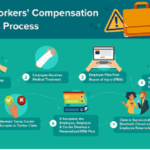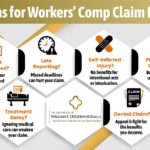Workplace injuries can turn life upside down in an instant. Whether it’s a sudden accident or a long-developing condition, dealing with medical bills, time off work, and insurance companies can be overwhelming. That’s where understanding your rights under workers’ compensation becomes crucial, as these benefits exist to help workers with job-related injuries or illnesses get the support they need.
Let’s walk through the essentials – so you’re not only informed but empowered if the unexpected happens.
You’re Probably Covered – Even If You Think You’re Not
Most employees are entitled to workers’ compensation benefits, but many aren’t aware of it until they’re hurt. This type of insurance is designed to cover work-related injuries or illnesses, no matter who was at fault.
This includes:
- Sudden injuries – Like slipping on a wet floor or getting hurt while operating machinery.
2. Repetitive stress injuries – Carpal tunnel from years of typing or chronic back pain from lifting.
3. Occupational illnesses – Exposure to harmful chemicals or substances that cause long-term health issues.
Fun fact: The first recorded law for workplace injury protection dates back to ancient Sumeria around 2050 B.C. Talk about long-standing support!
Filing a Claim Isn’t Always Straightforward
While the system is meant to help, the process of filing a workers’ compensation claim can be more complex than expected. Deadlines, paperwork errors, and unclear employer communication can all derail your case.
Here are a few common mistakes people make when filing:
- Waiting too long to report the injury – Some states give you just a few days to notify your employer.
- Not seeing an approved doctor – In many cases, you need to see a physician listed by your employer’s insurance.
- Assuming the injury isn’t “serious enough” – Even minor injuries can worsen over time, and it’s better to be safe than sorry.
What You’re Entitled to After an Injury
Workers’ compensation isn’t just about covering medical bills – it’s designed to help you get back on your feet financially and physically.
Here’s what may be included in your benefits:
- Medical care for your injury or illness
- Temporary disability payments while you recover
- Permanent disability benefits if you have lasting damage
- Job retraining or placement services if you can’t return to your previous work
- Death benefits for dependents if the injury results in a fatality
Knowing what you’re owed is half the battle. Insurance companies don’t always offer the full picture upfront.
When to Consider Legal Help
In an ideal world, every injured worker would get their rightful benefits without hassle. But in reality, disputes happen – especially when claims are denied or benefits are cut off too soon. That’s when turning to trusted legal support, such as the guidance found on workerscompensationlawyer-philadelphia.com/, can make a real difference.
A workers’ compensation attorney can step in to:
- Handle appeals after a claim denial
- Gather medical evidence and expert testimony
- Negotiate with insurance companies
- Represent you in hearings or mediation
Interesting tidbit: According to recent statistics, injured workers represented by an attorney are more likely to receive higher settlements than those who go it alone.
Workplace Injuries Are More Common Than You Think
It might surprise you how frequent on-the-job injuries are across the U.S. According to the Bureau of Labor Statistics, nearly 2.6 million nonfatal workplace injuries were reported in a single year. That’s roughly one injury every 12 seconds during a typical 40-hour workweek.
Some of the most commonly reported incidents include:
- Overexertion and lifting injuries
- Slips, trips, and falls
- Equipment-related accidents
- Exposure to harmful substances
- Repetitive motion injuries
Take Action Sooner, Not Later
If you’ve been injured at work, time is not on your side. Each state has its own deadlines for filing, appealing, and collecting benefits. The sooner you act, the better your chances of avoiding unnecessary complications or missing out on compensation altogether.
You don’t have to face it alone. Getting informed, taking the right steps, and seeking help when needed can make all the difference in your recovery – physically, emotionally, and financially.
Injuries may be part of life, but losing your rights shouldn’t be. Whether it’s a sprain from a fall or a long-term injury caused by repetitive work, you deserve to be heard, helped, and compensated fairly.















